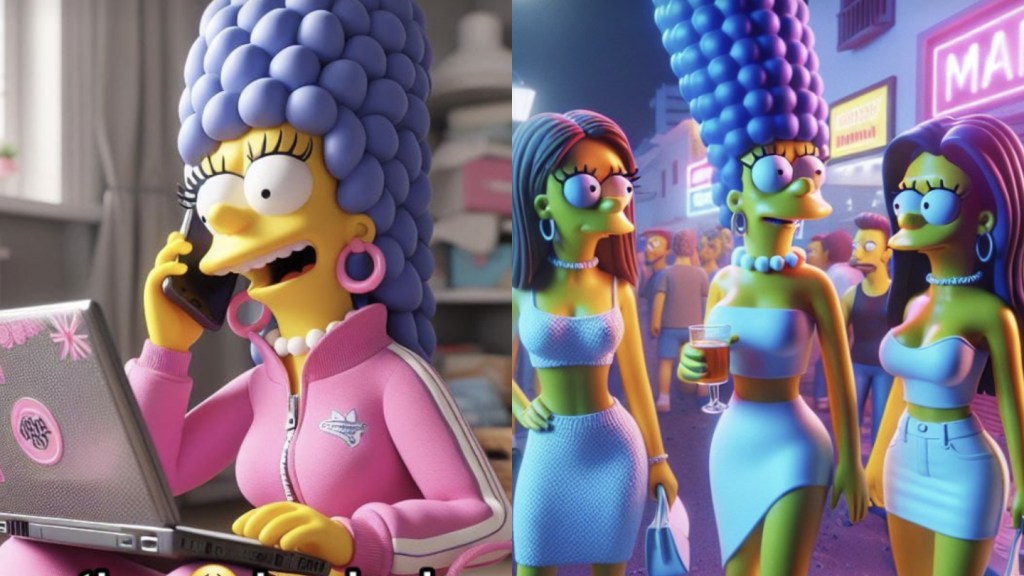In the third season of Unbreakable Kimmy Schmidt, the titular character (Ellie Kemper) gets dressed up for a party with a group of college students, all of whom are rabid feminists. Decked out in a tight red dress and thigh-high Ariana Grande boots, Kimmy checks herself out in the mirror, clearly uncomfortable with her overtly sexual appearance. “So this is feminism,” Kimmy says, toddling around in her boots. “I didn’t know it’d hurt my feet so much.” “That’s so your butt looks good,” one of the students chimes in. “For you.”
It’s not the show’s strongest joke. For one thing, it’s a little stale; sex-positive feminism had already been skewered to better effect with “Put Yourself First,” the pitch-perfect Fifth Harmony parody from Crazy Ex-Girlfriend. But at the risk of committing the unpardonable sin of deconstructing a joke, it also doesn’t work because its premise—that wearing high heels is inherently contradictory to the tenets of feminism, because high heels are a patriarchal construct—is flawed. Unless you’re over the age of 40 or a radfem in the vein of Andrea Dworkin, you know that it’s perfectly fine to wear or not wear heels.
Videos by VICE
The joke is just one example of the weirdly stodgy, retrograde, sex-negative, anti-feminist humor that plagues Unbreakable Kimmy Schmidt’s otherwise strong third season—and, to a large degree, executive producer Tina Fey’s entire career.
For Fey, who has built a legacy on breaking the glass ceiling for women in comedy, “Kimmy Is A Feminist!” seems strangely resentful of—or, at least, baffled by—feminist culture. In the episode, Kimmy befriends a posse of Columbia University students who are basically walking Breitbart News headlines about campus culture. They liberally quote Simone de Beauvoir (even though any campus feminist would know that de Beauvoir was problematic in her own right), balk at the term “you guys,” and take classes on power and gender in contemporary yogurt commercials.
At one point, a guy hits on Kimmy by offering her a consent contract. This is an obvious nod to California’s 2014 “yes means yes” law, which conservative pundits mocked as a prime example of liberal overreach, envisioning college students signing contracts before agreeing to go down on one another. Of course, that’s not what the law actually entailed, but apparently the show’s writers thought the concept of a dude asking a woman if it’s OK to have sex with her was comedic gold.
The episode concludes that by dressing sexy, getting wasted, and grinding against dudes at parties, these college students are just as beholden to the patriarchy as their less well-educated, less progressive forebears. Of course, those aren’t necessarily “anti-feminist” actions so much as they’re examples of shit that college students do. But the show’s writers seem to view this behavior as a sign of intellectual immaturity, a point crystallized when Kimmy sees a roomful of inebriated college students, babbling incoherently and unsuccessfully trying to feed themselves noodles, and deems them “babies.”
The show’s skewering of millennial entitlement and campus culture gone awry is not entirely without merit: Not a day goes by when we don’t see a headline about culturally appropriative campus foods, and when Kimmy politely rebuffs the guy who’s trying to have sex with her, he calls his mom and demands she explain why—resonating with any woman who’s had the gall to reject a 20-something manchild. But within the context of Fey’s oeuvre, this skewering seems less like a few off-handed jokes here and there, and more like another example of a long-standing vendetta against sex positivity.
I’m not the first person to point this out, either: In the past, Fey has been accused of whorephobia, due to her claims that sex workers were victims of childhood sexual abuse (which has been debunked by studies), 30 Rock jokes about under-the-bridge prostitutes, and an interview she gave about strippers, where she said that while she enjoys dressing as a stripper to make fun of them, “that whole industry needs to die by us being a little better than that.”

In Kimmy Schmidt, that whorephobia is once again on display. After Kimmy claims she looks like a hooker, her friend corrects her: “They’re called sex workers. And they’re heroes.” Her deadpan earnestness is amusing, but is it really that outrageous that a woman who performs sexual labor to put food on the table—and according to some statistics has a shorter life span and 45 percent to 75 percent chance of experiencing violence as a result—could be considered heroic? They’re certainly more heroic than the team of Ivy League–educated writers making fun of them.
In both 30 Rock and Kimmy, Fey has created two strong, independent women characters who just aren’t all that interested in sex—which isn’t offensive in itself. However, by continuously mocking women for dressing like whores—or at least, by claiming that women are deluding themselves when they consider dressing like whores and owning their sexuality empowering—Fey is making the dangerous (and extremely retrograde) statement that sex positivity and feminism are mutually exclusive.
Women who proudly flaunt their feminist credentials while flaunting their cleavage aren’t intellectually unsophisticated “babies.” We’re not fooling ourselves into thinking that we’re subverting the male gaze by putting on wedges, or grinding our asses into dudes’ boners; we know exactly what we’re doing. We just don’t think that wearing a bodycon dress and flirting with randos negates the decades-old struggle for gender equality. In fact, in many ways, it advances it.
For decades, women have been unable to freely pursue their sexual desires without being shamed for them, while men have had the ability to stick it wherever they wanted. In many cases (for instance, when young women got pregnant and sought back-alley abortions), this double standard had a body count. Even though we’ve done a lot to eliminate slut-shaming in our society, in the case of slut-shamed young women like Phoebe Prince or Rehtaeh Parsons, who were bullied to the point of taking their own lives, that body count persists today.
Regardless of what Kimmy Schmidt might tell you, the fight for women to take ownership of their sexuality is not a small one, and it does not negate the continued fight for gender equality; indeed, the two are part and parcel of each other. The same can be said of the other tenets of sex-positive feminism that the show mocks, such as consent culture (something that should be treated with particular sensitivity, especially considering the fact that Kimmy is an abuse survivor) and whorephobia. Because females are strong as hell—even if they wear thigh-high boots.
Follow EJ Dickson on Twitter.




